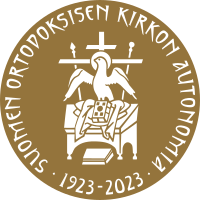Your All-Holiness,
Most Reverend brothers,
the reverend guests,
and beloved sisters and brothers,
The Orthodox Church of Finland has traversed its autonomic journey under the Ecumenical patriarchate for a hundred years. I want to take this moment to briefly reflect upon our journey and have a glance into the future as well.
The recent history of our Church can be conceived as beginning from the first decades of the 20th Century. In those years, the political tensions formed both Finland’s future and Europe’s history. Our nation gained independence in 1917, but ideological clashes tore it apart only a year later. In the Civil War, many Orthodox churches were defamed and destroyed.
In addition, the political threats cast their long shadow upon the life of the Orthodox Church here in Finland. Nevertheless, the young republic felt it was essential to integrate the Orthodox minority into itself. The decrees given by the government in 1918 and 1925 strengthened this conviction. The Tomos given by the Ecumenical Patriarchate in 1923 was of similar stabilizing importance. The latter gave our Church the blessing of autonomy while consolidating our canonical connection to the Holy See of the Mother Church.
The Second World War meant another time of suffering for Finland. To the Carelian Orthodox people, the burden was two times heavier: the horrors of war required them to emigrate, thus creating in them a sense of being a stranger, which in turn left them with deep, sometimes even permanent scars. Many probably know that our Church lost 90 % of its material possessions due to the war. People were forced to leave their homes, beloved monasteries, sanctuaries, and graveyards behind the new border. Many people also lost their faith and identity while coping with the new life.
However, through these hardships, we have found the strength to grow, unite and improve. The Finnish Orthodox persistently opposed, with the support of the Finnish government, the pressure the Soviet Union employed to join the Patriarchate of Moscow. After the death of Stalin in 1953, the canonical status of our local Church was no longer contested. Our bonds with the Ecumenical Patriarchate began to grow through monastic connections, theology students, and personal ties. These connections crowned our independence and made us a part of the larger family of Churches.
The liturgical work of Archbishop Paul greatly invigorated our parish life from the 1960s. The image of our Church started to change gradually in the public eye. Relations with the majority Church, the Evangelical-Lutheran Church, started to develop in ecumenical spirit. The false characterization of our Church as ”a church of Russians” was abandoned, and we became a valued part of Finnish society.
Today’s mission of our Church is supported by many organizations, of which I would especially mention the Orthodox Youth Association, which celebrates its 80th anniversary. The monasteries of Valamo and Lintula flourish again and conduct, alongside the parishes, the local missionary work.
Dear listeners! After many years of suffering, our Church acquired its autonomy from the Ecumenical Patriarchate. Nevertheless, I certainly do not want to give the last word to suffering. However, a hundred years later, we can witness the sufferings of millions of people brought about by the Russian invasion and patriarch Cyril’s distorted doctrine of holy war. I pray ceaselessly for the children deported into Russia and those who have escaped the war. I will pray that they find safety in our country and solace in our Church.
I still believe that the world is fundamentally good and beautiful. However, seeing these fundamentals is not a matter of mere attitude. Faith is needed. Furthermore, faith is an attitude toward life, where we grow in small steps through crises and tribulations.
As the pages of history turn, the pages of the future await their authors. The story of our local Church is a story of hope, courage, and a sense of unity when seen in the right light. Therefore, I believe that our Church will be something great in the future as well; it will be a responsible, hospitable, living, and open community, offering a place for spiritual and human growth and providing understanding and meaning of life for people of all ages regardless of their background. We have the opportunity to serve as a bridge in multicultural Finland and bring with us the notions of appreciative dialogue, respect, and love for one’s neighbor.
I invite all of you to this work since it is only together that we can build a future that reflects the wisdom of the past and sees every person as a valuable part of this story. Many merciful future years!
